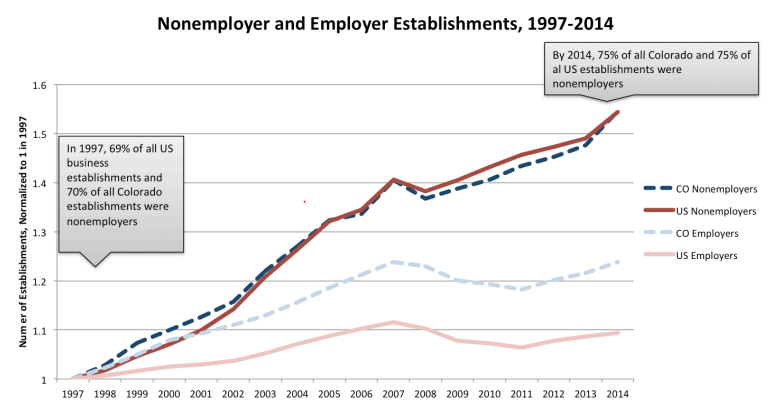“Gig” is no longer just a term used by garage band hopefuls.
The Regional Economic Development Institute (REDI) has released a new report documenting the growth of a “gig economy” in Colorado. A gig economy refers to a self-employed workforce that performs on-demand tasks directly for clients, often on a short-term basis (i.e. “gigs”).
These workers are seen as “nonemployer establishments” in the eyes of economists, meaning they are businesses with no other employees other than the proprietor and that they are subject to federal taxes. This is in contrast to “employer establishments” which are all businesses with at least one employee in addition to the owner.

REDI compared Colorado trends to that of the country, which unveiled some expected – and unexpected – findings. In both Colorado and the United States as a whole, the growth of nonemployers dramatically outpaced the growth of employer establishments.
“Self employment tends to increase more quickly than wage and salary jobs during a recovery,” reports REDI contributors Nicholas Kacher and Stephan Weiler. “In the case of the Great Recession (2008), a particularly large number of people lost their jobs, so there was an even greater pool of potential workers who might tend towards self-employment.”
Where Colorado differs from the country is in success of employer establishments. While still lower than nonemployer establishments in terms of quantity and growth percentage, Colorado remains a better location for employers to attempt new ventures. Whether this is because of the entrepreneurial culture of the region or out of necessity due to the recession’s impact is not fully known.
Regardless, statistics show that roughly 10-20% of nonemployers eventually begin employing their own workers. Growing businesses need additional workforce.
Recent events like the Colorado Mills flooding in May is an example of that supply and demand in practice. Despite 90,000 workers being displaced by the natural disaster, many of those retail workers were absorbed to fill empty positions across all industries, not just retail. Colorado has the lowest unemployment rate in the country, making it a bit of a “worker’s” economy. While that sounds good on the surface, too many open jobs is not sustainable.
“Companies that want to expand struggle because they can’t get the exact people to find their needs,” notes Stephan Weiler, economics professor at Colorado State University and director of REDI.
Economists are not asking if Colorado will match U.S. trends for employer establishment growth, but when.
The Regional Economic Development Institute is an engaged research enterprise that aims to understand, analyze, and inform economic development strategies particularly in struggling regions in both rural and urban areas, especially in Colorado. To read more about the gig economy and other issues impacting Colorado’s economy, you can find a bi-monthly report on REDI@CSU’s website.